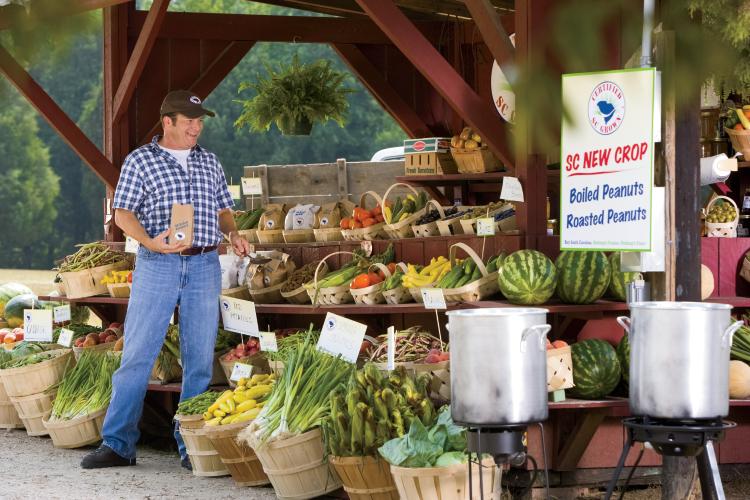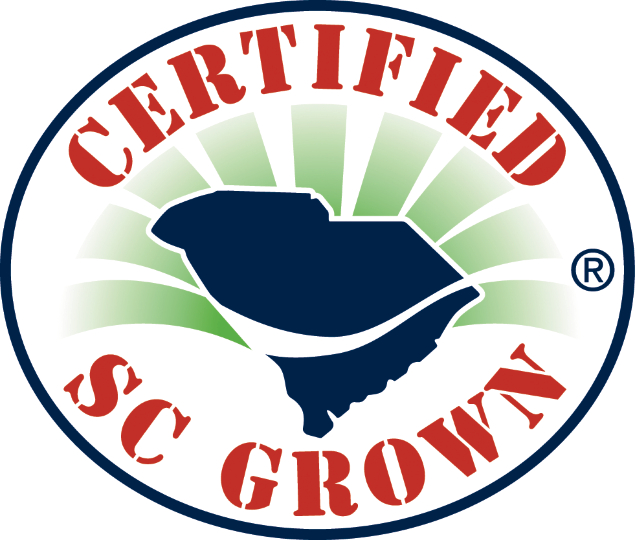Home > South Carolina > South Carolina Farm to Table > State’s Consumers Believe in Benefits of Local Food
State’s Consumers Believe in Benefits of Local Food

When food grown or prepared in South Carolina appears on the menu, residents tend to buy it with pride.
The home state preference gives a heartbeat to the Certified South Carolina program, which brands and promotes locally grown agricultural products. The program’s extensive labeling helps consumers easily identify and buy fresh, high-quality local food.
“Prior to the program, our state’s farmers had no means to consistently brand South Carolina into their products to take advantage of a growing demand for local food,” says Ansley Rast Turnblad, coordinator of Certified South Carolina, a program of the South Carolina Department of Agriculture. “At the same time, consumers who wanted to eat locally had no easy way to identify or have convenient access to South Carolina products.”
Restaurants, grocery stores, farmers markets, and even some hospitals and school cafeterias, sell or serve Certified South Carolina. Program logos appear on everything from boxes of peaches to barbecue sauces, retail signs and restaurant menus. Consumers most often recognize the program under its popular branding labels Certified SCSC Grown and Certified SCSC Product.
Since its start in 2007, free membership in the program has exploded from 60 farmers to more than 1,200 farmers, processors, wholesalers and retailers who use the brand. Ultimately, the branding and marketing effort helps revitalize the state’s rural economy. In fact, a recent survey shows some members credit the program for a 12 percent increase in annual sales.
A second phase of the program, known as “Fresh on the Menu,” benefits restaurants which serve local foods. Today, more than 300 participating restaurants agree to include at least 25 percent Certified South Carolina foods on their menus and feature the Fresh on the Menu brand.
“Restaurant participation from across the state is vital to the continued success of the Certified SCSC Grown program,” Turnblad says.
Meanwhile, Certified South Carolina continues to grow. The relatively new Certified SCSC Arts and AgriCulture benefits artists and arts-based businesses and events. Other branding efforts, like Certified SCSC Seafood will launch soon.

From Farm to School
Likewise, Certified South Carolina materials surface in school cafeterias.
Almost 100 schools and child care centers display Certified SCSC Grown promotional materials as one of four requirements in the South Carolina Farm to School program. Those schools have earned grants of $2,000 to $5,000 to implement the program, which puts produce grown by South Carolina farmers on the lunch trays of thousands of schoolchildren.
The program is a joint effort between the state’s Department of Education, Department of Agriculture, Department of Health and Environmental Control and Clemson University.
“I’ve been amazed with this program and how much of an impact we can have in a short time across multiple sectors,” says Holly Harring, statewide Farm to School coordinator. “We have been able to access low-income children, as well as farmers.”
Children consume up to 50 percent of their total energy intake at school, according to the USDA. A Farm to School study shows a strong interest among farmers to sell produce that meets school needs and among the state’s public schools to buy local-grown produce. More than 1,200 schools are eligible to participate in the Farm to School program.
The program started in South Carolina in 2011. Its aim is to reduce obesity risk among children and boost agricultural markets. Participating schools must use at least two South Carolina-grown fruits and vegetables monthly, integrate nutrition and agriculture education into the curriculum and grow a vegetable garden.
Several schools now provide vegetables from their own gardens to their cafeterias, serving nutrition with a side of pride.



